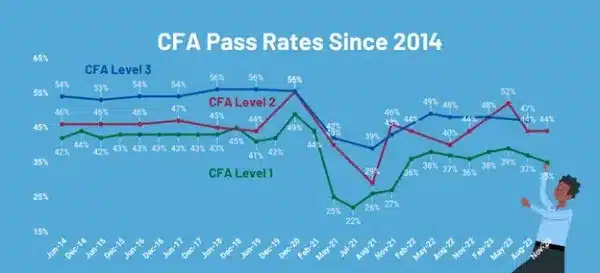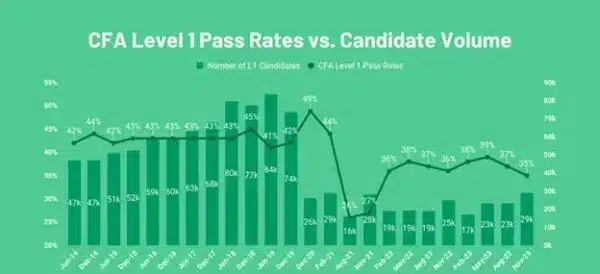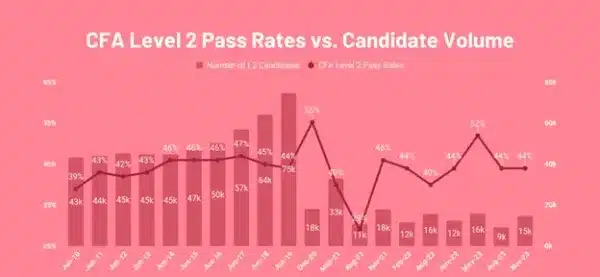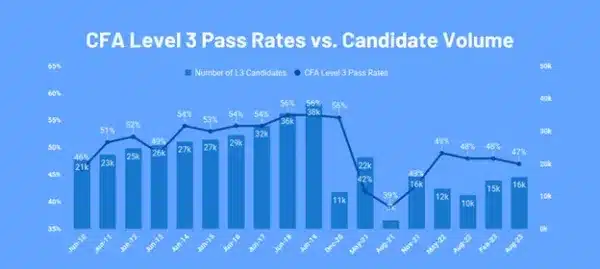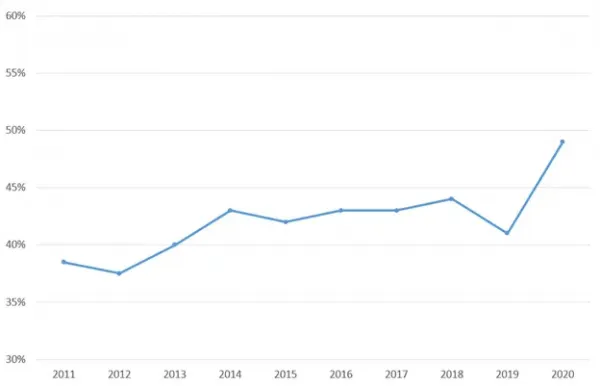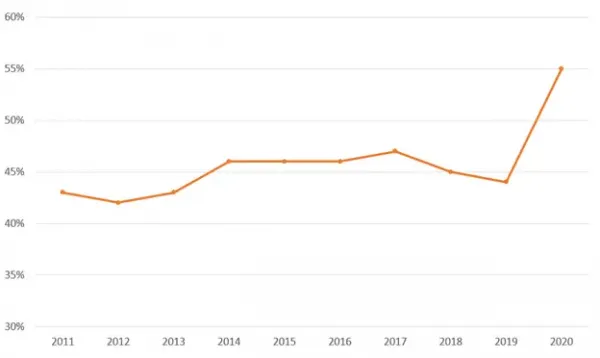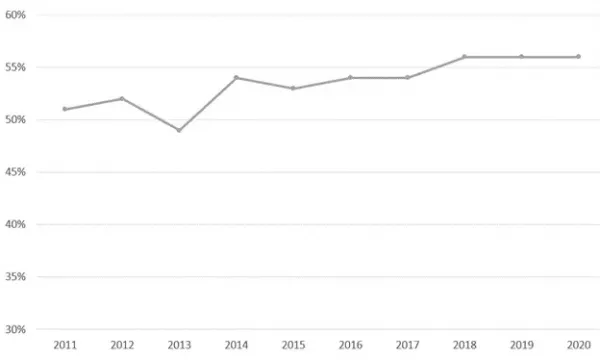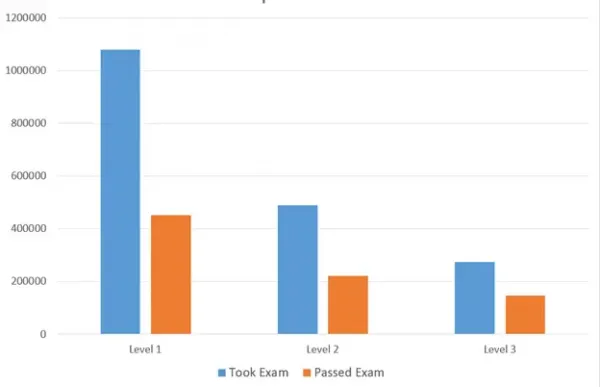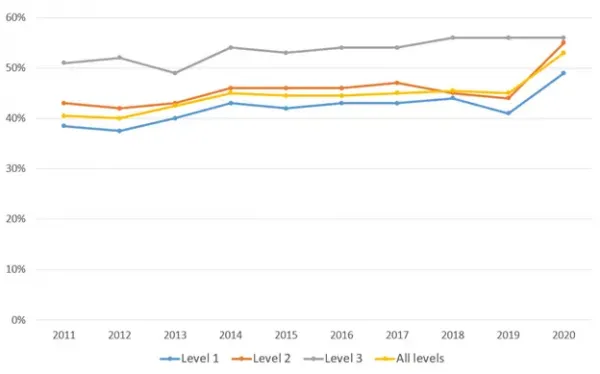Breaking Down CFA Pass Rates by Levels and Years

Here's What We've Covered!
- Understanding CFA Pass Rates
- CFA Passing Rate for Each Level For The Last 3 Years (2020 to 2023)
- CFA Passing Rate for Each Level For 2011 to 2020
- Factors Influencing CFA Pass Rates
- Tips for Improving Your Chances of Passing
- FAQs
- Is CFA tougher than CA?
- Can I Pass CFA with 60%?
- What is considered a good CFA pass rate?
- How do pass rates vary between CFA levels?
- What role does candidate preparation play in pass rates?
- Do pass rates vary significantly by geographical region?
- How often does the CFA Institute update its pass rate statistics?
The CFA exams are vital for finance professionals, testing their knowledge and skills in investment management. Passing these exams demonstrates expertise and dedication, opening doors to lucrative career opportunities.
Understanding CFA pass rates by levels and years is crucial for candidates. It helps them gauge the difficulty of each level and identify trends over time, guiding their study strategies effectively.
Breaking down CFA pass rates provides valuable insights into exam performance. Analyzing pass rates by level and year reveals trends, such as changes in exam difficulty or candidate preparation, helping candidates better prepare for success.
Understanding CFA Pass Rates
CFA pass rates refer to the percentage of candidates who successfully pass the Chartered Financial Analyst (CFA) exams within a given period. These rates are significant indicators of the difficulty and rigor of the exams, providing insights into candidate performance and the overall effectiveness of exam preparation.
CFA pass rates show how many candidates pass the CFA exams. They help aspirants see how tough the exams are and if they need more study. Knowing pass rates helps plan study better and understand if the exams are getting harder or easier over time. Pass rates matter because they affect how people feel about the exams. If rates are too high, the exams might not seem prestigious. If they’re too low, they might feel too hard. The CFA exams are known to be challenging, but not the toughest.
Did you know, 84% of our students recommend that you join Proschool for your CFA Prep
CFA Passing Rate for Each Level For The Last 3 Years (2020 to 2023)
CFA Level 1 Exam Pass Rates Analysis
Recent Level 1 pass rates have consistently fallen below the all-time average of 41%. The July 2021 pass rate hit an all-time low of 22%, signaling a concerning trend. Despite slight corrections, anxiety within the CFA community remains high. Candidates’ significant investments of time and money have led to disappointing outcomes, underscoring the challenges faced in attaining the CFA designation.
| CFA Level 1 Exam Administration | CFA Level 1 Exam Pass Rate |
| December 2020 | 49% |
| February 2021 | 42% |
| May 2021 | 25% |
| July 2021 | 22% |
| August 2021 | 26% |
| November 2021 | 27% |
| February 2022 | 36% |
| May 2022 | 38% |
| August 2022 | 37% |
| November 2022 | 36% |
| February 2023 | 38% |
| May 2023 | 39% |
| August 2023 | 37% |
| November 2023 | 35% |
Get Jobs straight after completing CFA Level 1, 700+ Core Finance Jobs waiting for you
CFA Level 2 Pass Rate Analysis
The Level 2 exam has an all-time average pass rate of 46%. While recent results have fluctuated, the latest pass rate aligns closely with those observed in 2022.
| CFA Level 2 Exam Administration | CFA Level 2 Exam Pass Rate |
| December 2020 | 55% |
| February 2021 | 46% |
| May 2021 | 40% |
| August 2021 | 29% |
| November 2021 | 46% |
| February 2022 | 44% |
| August 2022 | 40% |
| November 2022 | 44% |
| May 2023 | 52% |
| August 2023 | 44% |
| November 2023 | 44% |
CFA Level 3 Pass Rate Analysis
The pass rate for the August 2023 Level III exam was 47%, reflecting a continuation of the low pass rate trend observed in 2022. Historically, pass rates for CFA Level III have reached as high as 56%.
| CFA Level 3 Exam Administration | CFA Level 3 Exam Pass Rate |
| December 2020 | 56% |
| February 2021 | 57% |
| May 2021 | 42% |
| August 2021 | 39% |
| November 2021 | 43% |
| May 2022 | 49% |
| August 2022 | 48% |
| February 2023 | 48% |
| August 2023 | 47% |
Also Read – CFA Jobs & Salaries In India After CFA Level 1, Level 2 & Level 3
Navigating Recent CFA Exam Pass Rates
Recent CFA exam pass rates have been notably low, especially in early 2021 and late 2020. While scores are starting to stabilize, candidates must understand the importance of thorough exam preparation. If you’re planning to take the exam soon, investing in a CFA exam prep package could significantly improve your chances of success.
CFA Level 1 Pass Rates vs. Candidate Volume
The chart illustrates the consistent rise in Level 1 candidates from 2015, showcasing the CFA exam’s enduring popularity. However, pandemic disruptions caused a significant decline, with candidate volumes dropping to about 60% of previous years.
Despite these challenges, Level 1 pass rates have generally held steady above 40% since 2014, except for a notable spike to 49% in December 2020. This increase is likely attributed to the additional study time afforded by COVID-19 exam postponements.
However, the impact of the pandemic persisted, with fewer candidates able to sit for the exam in December 2020, reflected in the pass rates for subsequent exams, notably in February 2021.
In May 2021, CFA Level 1 saw a sharp decline in pass rates, dropping to 25% from an average of 36%-49% since 2010. This trend continued with a further drop to 22% in July 2021 before slightly improving to 26% in August 2021.
Recent results from November 2023 show signs of improvement, suggesting pass rate trends are returning to normal, albeit slowly since February 2022.
According to the CFA Institute, the minimum passing score has remained consistent over the years, indicating a lower candidate quality from May to August 2021 due to pandemic disruptions.
The CFA Institute believes this low pass rate is temporary and linked to pandemic-related challenges.
CFA Level 2 Pass Rates vs. Candidate Volume
Pass rates for Level 2 remained steady and above 40% from 2011, with a notable rise to 52-55% for Dec 2020 and May 2023 exams.
Candidate growth for Level 2 has been increasing since 2015 but declined during the pandemic.
Except for the Dec 2020 ‘pandemic exam’, pass rates have been gradually decreasing since 2017 until August 2021. Following record-low pass rates in Aug 2021, recent results, especially in May 2023, indicate a positive trend, suggesting that the pandemic’s impact on pass rates is diminishing.
CFA Level 3 Pass Rates vs. Candidate Volume
CFA Level 3 stands apart from the other levels, with consistently high and stable pass rates. This is because Level 3 candidates are typically highly skilled and knowledgeable after passing Levels 1 and 2.
Like Levels 1 and 2, Level 3 experienced a significant drop in pass rates during the May 2021 exams, hitting a new low of 39% in August 2021. Notably, the August 2021 exam had a small cohort of only 2,769 candidates.
However, recent results, such as the August 2023 exam with a 47% pass rate, indicate a potential return to the long-term average.
Also Read – 6 Important CFA Updates & Curriculum Changes Announced in 2023
CFA Passing Rate for Each Level For 2011 to 2020
If you’re thinking about taking the CFA exam, it’s a good idea to check out past pass rates to see how tough it might be. Let’s look at how the pass rates for all three levels have changed over time, and what we can learn from these numbers.
CFA Level 1 Pass Rates
Over a decade, the average pass rate for CFA Level 1 has been 42%. While it’s not a walk in the park, there’s a positive trend upwards. In December 2020, the pass rate stood out at 49%, a bit higher than usual. However, fewer candidates took the test compared to previous years, with only 26,212 in 2020 versus 157,344 in 2019. Despite this, those who did take the exam performed exceptionally well. Whether this trend will persist in 2021 and beyond remains to be seen.
The average pass rates for CFA Level 1 over the last ten years, from 2011 to 2020.
Also Read – 5 Tips on passing CFA Level 1 with ease
CFA Level 2 Pass Rates
Over a decade, the average pass rate for CFA Level 2 has been 45%, slightly higher than Level 1. Notably, the pass rates saw a significant uptick in 2020, possibly due to the COVID-19 pandemic affording candidates more study time. However, other factors may have contributed to this increase as well. It’s worth noting that fewer candidates sat for the Level 2 and 3 exams in 2020 compared to previous years.
The average pass rates for CFA Level 2 over the last ten years, from 2011 to 2020.
CFA Level 3 Pass Rates
Over a decade, the 10-year weighted average pass rate for CFA Level 3 has been the highest at 54%. Interestingly, unlike the other levels, the pass rate for Level 3 in 2020 remained consistent with the rates of the preceding years.
The average pass rates for CFA Level 3 over the last ten years, from 2011 to 2020.
CFA Program Completion and Drop-out Analysis
Since the CFA exam is tiered, with candidates needing to pass one level to progress to the next, it’s valuable to consider dropout rates to gauge program completion. While precise completion rate data is scarce, estimating overall success rates can be done by examining the number of candidates at each exam level.
Completion Rate: 2011 to 2020
Candidates vs. Passers: CFA Exam Analysis
Over the past decade (2011-2020), a total of 1,079,679 individuals attempted the Level 1 CFA exam. During the same period, 490,189 candidates sat for the Level 2 exam, and 273,394 appeared for the Level 3 exam. Based on these numbers, around 25% of candidates complete all three levels.
Below is a summary of CFA exam pass rates over the past decade, concluding in 2020. It’s important to note that the CFA exam format has evolved since 2020, hence the separation of this data from more recent pass rate information provided earlier.
Get Offline CFA Classes in your city. Proschool has 15+ CFA classes throughout India
FA Pass Rates from 2011 to 2020
Analyzing CFA Exams Pass Rate Trends Over Time
Since its inception in 1963, there has been a general downward trend in pass rates across all three levels of the CFA exams. However, pass rates tend to increase as candidates progress to Levels 2 and 3. Notably, over the past 15 years, pass rates have started to stabilize. See the results from 1963 to 2020 here.
Factors Influencing CFA Pass Rates
- Exam Formats
The way the CFA exams are structured can have a big impact on pass rates. For example, changes in the format of questions or the number of questions can affect how well candidates perform. If the exam becomes more difficult or unfamiliar, pass rates might go down. On the other hand, if the exam format stays consistent and candidates know what to expect, pass rates might be higher.
- Candidate Preparation Strategies
How candidates prepare for the CFA exams can also influence pass rates. Some candidates might use study materials that aren’t effective, leading to lower pass rates. Others might not spend enough time studying or might not understand the material well enough. On the flip side, candidates who use proven study strategies, such as practicing with mock exams or seeking help from tutors, are more likely to pass.
Also Read – A Detailed Guide On Work Experience Requirements For CFA
How Hard Is CFA?
How difficult are the CFA exams, really? While historical pass rates offer insight, they don’t fully gauge difficulty. A more objective measure comes from the UK NARIC’s benchmarks.
According to UK NARIC, the CFA exams are benchmarked individually by level under the UK Regulated Qualifications Framework (RQF):
- CFA Level 1’s difficulty is comparable to a Diploma of higher education (Level 5 qualification under RQF).
- CFA Level 2’s difficulty is comparable to a Bachelor’s degree (Level 6 qualification under RQF).
- CFA Level 3’s difficulty is comparable to a Master’s degree (Level 7 qualification under RQF).
With RQF Level 8 indicating a difficulty equivalent to PhD programs, passing all three levels of the CFA exams is certainly no easy feat!
Tips for Improving Your Chances of Passing
- Maximize Your Study Time – Invest around 307 hours per level and tailor your study schedule using resources, exam review and tools from IMS Proschool’s CFA Prep Course. Stay flexible, track progress, and maintain balance for effective preparation.
- Find Ideal Study Environment – Carve out dedicated study time and choose a quiet home office, serene library, or bustling coffee shop where you can focus. Join live classes for structure or opt for self-study. Consider investing in a review course for valuable insights.
- Final Month Preparation – Complete studies a month before the exam and focus on practice exams, reviewing, and addressing challenging topics. Simulate test conditions during mock exams and familiarize yourself with the CFA Institute’s rules and guidelines.
- Pay Attention to Ethics – Thoroughly understand the “Ethical & Professional Standards” section, as 63% of test-takers found it challenging. Differentiate between nuanced choices in multiple-choice questions to excel.
Congratulations on embarking on your CFA journey! We trust this guidance will aid your preparation. Now, it’s time to dive into your studies!
Utilizing CFA Institute resources effectively
Upon registering for the CFA Program, you’ll unlock a range of resources tailored to aid your exam preparation journey. Here’s what you can expect:
- Official program curriculum to guide your studies
- Tailored study sessions for each exam level
- Personalized study plans to suit your needs
- Practice questions embedded throughout the curriculum
- Mock exams simulating the exam-day experience
- Comprehensive study resources and helpful tips
IMS Proschool provides a comprehensive platform for CFA exam preparation, offering expert guidance, personalized study plans, interactive learning sessions, and realistic exam simulations. Whether you’re beginning your CFA journey or seeking to enhance your preparation, IMS Proschool equips you with the tools and resources needed to succeed.
Also Read – How are CFA And Financial Modeling Connected? Why Should You Study Both in the Same Course?
FAQs
-
Is CFA tougher than CA?
Both the CFA and CA are rigorous and demanding in their own ways. The difficulty level can vary depending on individual strengths and preferences.
-
Can I Pass CFA with 60%?
The Minimum Passing Score (MPS) for CFA Level 1 exams has fluctuated between 56% and 74% from 2012 to 2024, averaging 65% over 12 years. The estimated MPS for the most recent Level 1 exam in November 2023 is around 68%. Hence, achieving a score of around 60% in practice exams is positive, but it doesn’t guarantee passing the CFA exam. The actual passing score (MPS) varies and depends on factors like exam difficulty and candidate performance. It’s crucial to focus on understanding the material comprehensively rather than aiming for a specific percentage score.
-
What is considered a good CFA pass rate?
On the lines of the 90th percentile and 10th percentile. Given that the pass rate for the CFA exams is about 40%, this means about 1 in 4 passing candidates would perform above the 90th percentile line.
-
How do pass rates vary between CFA levels?
Pass rates tend to vary between CFA levels, with Level 1 typically having the lowest pass rate and Level 3 having the highest. However, pass rates can fluctuate from one exam sitting to another due to various factors.
Here’s the breakdown of the pass rate ranges and 10-year averages for each level of the CFA exam:
Level 1: Pass rates range from 22% to 49%, with a 10-year average of 39%.
Level 2: Pass rates range from 29% to 55%, with a 10-year average of 45%.
Level 3: Pass rates range from 39% to 56%, with a 10-year average of 50%.
-
What role does candidate preparation play in pass rates?
Adequate preparation, including thorough study of the curriculum, practice exams, and review of key concepts, can increase the likelihood of passing the exam.
-
Do pass rates vary significantly by geographical region?
Pass rates may vary by geographical region due to differences in candidate demographics, educational backgrounds, and study resources available. However, the CFA Institute does not officially publish pass rates by region.
-
How often does the CFA Institute update its pass rate statistics?
The CFA Institute typically updates its pass rate statistics annually, after each exam sitting. These statistics are released to provide candidates with insights into historical pass rates and trends.
Resent Post
>
Best Study Abroad Courses for Commerce Graduates
>
Emerging commerce career options in India (2026): From CA to Data Analyst
>
ACCA Opportunities You Didn’t Know About – Think Beyond Audit!
>
Which Courses After 12th Commerce With High Salary Are in Demand Worldwide?
>
How to Find ACCA Jobs Online After Qualifying: Real Portals, Tips & Career Guidance
Follow Us For All Updates!

